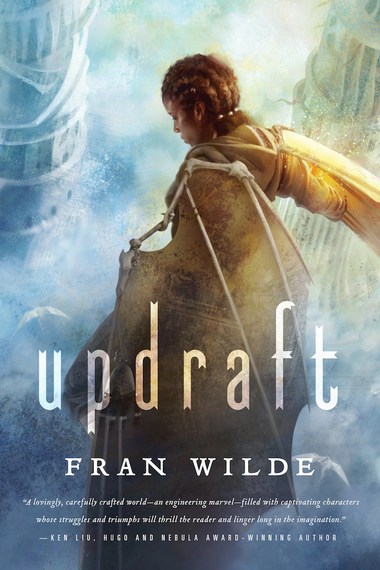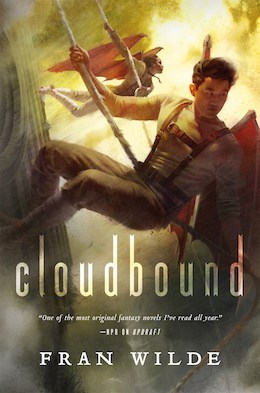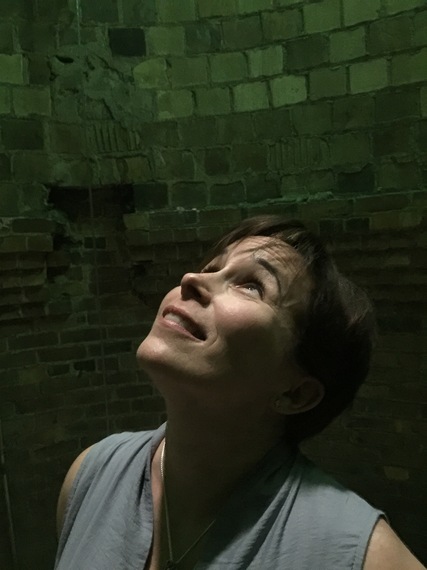Fran Wilde has created a remarkable world of bone towers and sky monsters--a world that can only be navigated by means of ingeniously engineered wings. Updraft, the first in the Bone Universe series, won the Andre Norton Award for Young Adult Science Fiction and Fantasy and the Compton Crook Award. The sequel, Cloudbound, goes to darker places as political upheaval takes hold.
Fran and I were debut buddies--our first novels came out at the same time from Tor Books, and we toured New England together. It was my pleasure to catch up with her about the release of Cloudbound, her complex political landscape, the lure of monsters, and her plans for the series.
Updraft has a delightful origin story, which I heard you tell when we were on tour together. Can you share it here?
Surely! Shortly after I finished writing my first novel (a near-future science fiction story that I'll revisit at some point), I wrote a short fantasy story called "Bone Arrow, Glass Tooth," that featured a winged knife fight in a wind tunnel, within a tower of living bone. I planned to sell it to one of my favorite short story markets, but before I did, I shared the story with my beta readers, saying "I'm really glad to get back to writing short stories for a bit!" And they looked at the story, and at me, and said, "Well, we have good news and bad news. This feels like a bigger story." They were so very right.
Updraft is a coming-of-age story about a young woman, Kirit Densira. In Cloudbound you shift perspectives to tell the story of her friend Nat. This means there are more politics, since Nat is involved in that, and it's also an opportunity to observe Kirit from the outside. What do you think this point-of-view shift achieves?
I loved the reaction to Kirit's voice in Updraft. She's compelling, high-spirited, and, most of all, pretty brash. When she sets a goal, she heads right for it, no matter what's in the way. That's a lot of fun to read and a lot of fun to write. And I promise that voice will return.
For Cloudbound, I wanted to explore ideas about leadership and how communities grow and change after a revolution. And while Kirit leads by example very well, she doesn't want to be a leader. Nat, on the other hand, really wants to be a leader. He has no idea how to go about doing that, but he's going to give it a shot, make mistakes, and keep trying. I think that's an important story to tell in this world, while also continuing the adventure.
Writing in a first person point of view, as I do in Updraft and Cloudbound, offers a lot of opportunities to really pull a reader into a story. The narrative "I" becomes a mask that the reader can put on and use to become immersed in the world and character very quickly.
In a world like that of the Bone Universe, there are so many stories happening at the same time that don't fit in one person's narrative. Often, I'll spin those into short stories and publish them (there's a short story set in the Bone Universe online for free in Lightspeed this month, and another in Beneath Ceaseless Skies).

Meantime, I knew from the start that the story I began in Updraft could be told from either Kirit's or Nat's perspective. Giving Kirit the first book and Nat the second allowed me to offer the reader a chance to shift perspectives and see the world from a very different point of view. Doing that means -- as you noted -- that we can see Kirit as Nat sees her, instead of only as she sees herself. Similarly, we get to see Nat's view of the world, and politics, and readers get to experience a broader, more nuanced view of everything. That's a big risk, especially when readers are attached to a particular voice already. It's also an opportunity to expand perspectives and empathies for others stories. As well, it's a chance to see that hero-sidekick paradigm flipped on its head.
There is a lot of political complexity in your novels. How do you think fantasy allows you to explore political issues?
I think that fantasy allows for layers and metaphor in ways that are very visual and high impact. Someone said lately that the clouds in my universe work as a kind of cultural subconscious and I like that very much. The high-and-low aspect of the towers, and the way that the Spire has grown differently from the rest of the towers has both a physical reality in the book as well as political repercussions. That's a huge advantage when exploring political and socioeconomic issues. It's also pretty fun.
You are also an aficionado of monsters, which of course function as symbols. Can you talk about your fascination with the monstrous?
Monsters come in all forms -- one of the biggest monsters in both Updraft and Cloudbound is actually gravity. I like exploring the monstrous and building monsters like the skymouths and Cloudbound's bone eaters because they are physical manifestations of what the culture might fear most... which is part of what makes a monster. History and myth give us many of these -- from Beowulf to Ovid and beyond. Figuring out how to defeat a monster, or even how to live alongside it peaceably (because sometimes a monster only seems monstrous), is an important life skill. It's a problem solving exercise on a high level -- discovering a monster's weaknesses and figuring out how to take it apart, or finding out where a monster comes from -- all are fascinating to me.
What are your plans for the series?
The next book, Horizon (working title), is with my editor. It will be out next year, and will complete the series arc. You'll see Kirit again, and others too. And more monsters, more intrigue.
Which authors have particularly inspired you?
That's a very hard question, actually, because I'm always reading, and finding new authors who inspire me. Currently, inspirations range from poets and essayists to fiction authors. I love science writers like John McPhee, David Quammen, and E.O. Wilson; younger audience authors including Norton Juster, Natalie Babbitt, Holly Black, Frances Hardinge. I always come back around to Jorge Luis Borges, Italo Calvino, Gabriel Garcia Marquez, China Miéville, and Chinua Achebe, as well as Pat Cadigan, William Gibson, and Neal Stephenson. Milton comes into it, Shelley. Hopkins, Neruda, Szymborska, Rukeyser, Bishop, Heaney, Dove, and Boland, also. My teachers - especially Heather McHugh, Larry Levis, Rita Dove, Elizabeth Bear, Steven Gould, Nancy Kress, Walter Jon Williams. Also, absolutely Frank Herbert, Flannery O'Connor, Isaac Asimov, and Ann McCaffrey. That's a pretty nutty list, but it's also always growing.

Fran Wilde is the author of the Andre Norton-, and Compton Crook Award-winning and Nebula-nominated novel Updraft (Tor 2015), its sequel, Cloudbound (Tor 2016), and the novella "The Jewel and Her Lapidary" (Tor.com Publishing, 2016). Her short stories appear in Asimov's, Tor.com, Beneath Ceaseless Skies, and Nature. She writes for publications including The Washington Post, Tor.com, Clarkesworld, iO9.com, and GeekMom.com. You can find her on twitter @fran_wilde, Facebook @franwildewrites and at franwilde.net.
*
Ilana Teitelbaum's writing has appeared in the Globe and Mail, the Los Angeles Review of Books, and Salon. Her epic fantasy debut, Last Song Before Night, was published in October 2015 by Tor/Macmillan under the pen name Ilana C. Myer.
